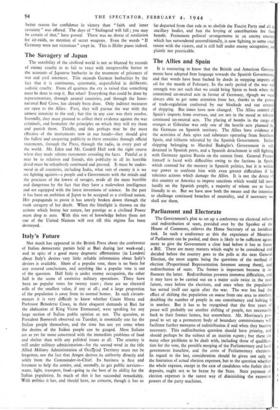Italy's Future
Not much has appeared in the British Press about the conference of Italian democratic parties held at Bari during last week-end ; and in spite of a good many dogmatic affirmations (in London) about Italy's desires very little reliable information about Italy's desires is available. Short of a popular vote, there is no basis for any assured conclusions, and anything like a popular vote is out of the question. Half Italy is under enemy occupation, the other half is the scene of extensive military operations. There have been no popular votes for twenty years ; there are no electoral rolls of the smallest value, if any at all ; and a large proportion of the population is away from its normal homes. In such circumstances it is very difficult to know whether Count Sforza and Professor Benedetto Croce, in their eloquent demands at Bari for the abdication of King Victor Emmanuel, were speaking for any large section of Italian public opinion or not. The question, as President Roosevelt observed on Tuesday, is essentially one for the Italian people themselves, and the time has not yet come when the desires of the Italian people can be gauged. Most Italians are as yet far more concerned with the immediate problems of food and shelter than with any political issues at all. The country is still under military administration—for the second word in the title Allied Military Administration of °eel-Vied Territory must not be forgotten, nor the fact that Amgot derives its authority directly and solely from the Commander-in-Chief. Its business is first and foremost to help the armies, and, secondly, to get public services— water, light, transport, food—going to the best of its ability for the Italian population. In much of this it has succeeded remarkably. With politics it has, and should have, no concern, though it has so
far departed from that rule as to abolish the Fascist Party and all its ancillary bodies, and ban the levying of contributions for their benefit. Permanent political arrangements in an enemy country which has surrendered unconditionally, is now fighting to some small extent with the victors, and is still half under enemy occupation, air plainly not practicable.






















 Previous page
Previous page